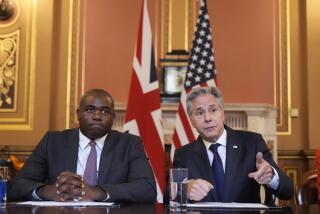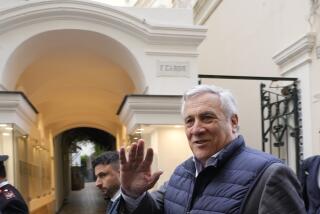Europeans Seek U.N. Intervention on Iran
BERLIN — The standoff between Iran and the West intensified Thursday when three European foreign ministers said Tehran should be referred to the U.N. Security Council for possible sanctions after talks failed to persuade Iran to stop work on technology that could produce a nuclear weapon.
The announcement by the ministers from Britain, France and Germany followed two frustrating years of negotiations in which Europe sought to lure Iran away from its nuclear research program. The case is expected to be examined next week by the International Atomic Energy Agency, the U.N. nuclear watchdog that advises the Security Council.
“Our talks with Iran have reached a dead end,” said German Foreign Minister Frank-Walter Steinmeier, who spoke during a brief news conference here with his counterparts, Jack Straw of Britain and Philippe Douste-Blazy of France. Straw said it was a “matter of very great regret” that Iran had decided to “turn its back” on negotiations.
The three European nations, known as the EU-3, acted as a diplomatic counterbalance to the less patient tone of the Bush administration, which has pushed for referral to the Security Council.
Secretary of State Condoleezza Rice said the U.S. was “gravely concerned” about Iran’s “dangerous defiance of the entire international community.... We have to look hard at how a strong message is sent.”
Rice would not say whether the U.S. could count on enough council votes to punish Iran.
The atmosphere of the European negotiations had grown bellicose in recent weeks as Iranian President Mahmoud Ahmadinejad called for the annihilation of Israel and his government announced it would resume nuclear research, including on uranium enrichment, a necessary step to produce concentrated fuel for civilian reactors or material for a nuclear warhead.
Iran has insisted that its activities comply with the Nuclear Nonproliferation Treaty, of which it is a signatory, and that its program is designed solely to produce electricity.
Despite growing condemnation of Tehran’s policies, Iran’s vast oil reserves, its business deals with Moscow and Beijing and the nation’s influence in the Middle East complicate the West’s attempts to build diplomatic leverage, U.S. and European officials say.
It is unclear what would ensue if Iran came before the five permanent members of the Security Council and whether the threat of sanctions would persuade Tehran to suspend its nuclear activities. If convinced by the U.S. that Iran’s program is dangerous and its attitude reckless, Britain and France, also permanent members of the council, could vote for sanctions. The two other members, Russia and China, historically have opposed such measures, as they did in the debate on North Korea’s nuclear program.
However, statements by Russian officials Thursday suggested that Moscow was angry that Iran had broken a voluntary moratorium and announced plans to resume uranium enrichment efforts, which experts say could produce enough material for a bomb in three to 10 years.
Moscow is Tehran’s partner in a controversial new nuclear energy plant in Bushehr, Iran. This week, Russia was unable to persuade Iran to accept a compromise proposal to satisfy the West in which a joint Russian-Iranian project would enrich uranium on Russian territory.
Russian Foreign Minister Sergei V. Lavrov urged Tehran to stick to its moratorium. “Without this decision it will be very difficult for us to continue to promote the efforts we have taken,” Lavrov said, adding that Moscow and Beijing would seek a diplomatic solution in coming days.
“I hope the Iranian leadership will hear our voice and will go along the way which was agreed upon before,” he said.
For its part, Iran threatened today to end voluntary cooperation with the United Nations, including allowing spot checks of atomic sites, if it was referred to the Security Council, Reuters news agency reported.
“The government will be obliged to end all of its voluntary measures if sent to the U.N. council,” Foreign Minister Manuchehr Mottaki was quoted as saying by the official news agency IRNA.
Iran’s actions have created greater unity within the Security Council, which views Tehran as dangerous and unpredictable, analysts say. When Iran notified the IAEA that it would resume unspecified nuclear research and development at its facility at Natanz, the United Nations anticipated maintenance work. But in a private letter to the nuclear agency, Tehran said it intended to move toward building a centrifuge plant to enrich uranium.
“That’s very bold,” said Robert J. Einhorn, a nonproliferation expert at the Center for Strategic and International Studies in Washington. “In the past the Iranians have been very careful to slice the salami very thin and not to pass the threshold to upset the Russians and Chinese. This time they jumped right over that red line. That will increase the likelihood of purposeful action in the Security Council.”
One U.S. official, however, said Washington was skeptical that significant measures would be taken against Iran. The official, who spoke on condition of anonymity, citing diplomatic sensitivity, said he believed there might be delays before the IAEA board of governors recommends action. He also expressed doubts that key U.S. allies -- including European countries -- would be willing to support even a first round of mild sanctions.
“We’re not as hopeful as everyone else,” the official said. An IAEA vote last year on a U.S.-backed resolution to condemn Iran’s nuclear activities showed the divisiveness. The resolution passed with 22 supporters, but 12 nations abstained, including Russia and China.
Estimates by the Institute for Science and International Security in Washington suggest that Iran could produce enough highly enriched uranium within three years of building a centrifuge plant. The U.S. has estimated such a capability would take 10 years.
A statement released by the EU-3 on Thursday said, “Given Iran’s documented record of concealment and deception, the need for Iran to build confidence has been and continues to be the heart of the matter.” It added that Tehran has repeatedly broken agreements with the IAEA, which has inspected Iran’s nuclear sites and found the nation to be in noncompliance with the nonproliferation treaty.
Talks between Europe and Iran since 2003 have been characterized by fits and starts that have frustrated the Europeans and the IAEA. Germany’s Steinmeier said that by resuming enrichment efforts, Iran has “canceled a process that we started on Dec. 21, 2005, in order to come back to talks, and has, according to our opinion, rejected an important chance.... However, we are still ready to solve the problem diplomatically.”
Times staff writers John Daniszewski in London, Maggie Farley in Palo Alto, Kim Murphy in Moscow, Christian Retzlaff in Berlin and Paul Richter in Washington contributed to this report.
More to Read
Sign up for Essential California
The most important California stories and recommendations in your inbox every morning.
You may occasionally receive promotional content from the Los Angeles Times.











